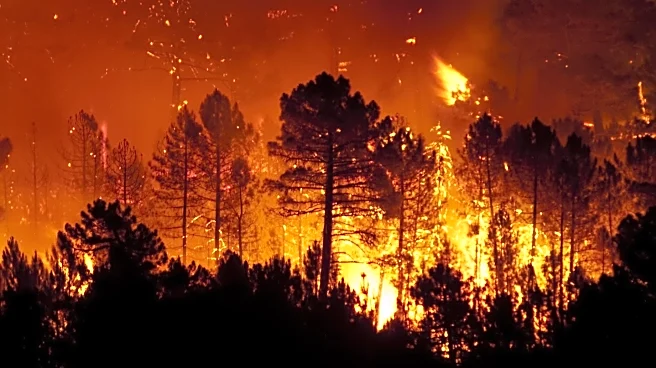What's Happening?
The tourism industry is grappling with the impact of rising global temperatures and increasing wildfires, which are affecting popular holiday destinations in Europe and North America. As fossil fuel pollution continues to alter the climate, traditional vacation spots are experiencing extreme weather conditions, including heatwaves, fires, floods, and droughts. This has led to a growing concern about the sustainability of mass tourism. At the ITB Berlin, a major tourism trade fair, experts discussed the future of travel, highlighting the potential decline of mass tourism due to these environmental challenges. Stefan Gössling, a prominent travel researcher, emphasized that worsening weather conditions are driving up travel costs, which could soon become unsustainable for consumers.
Why It's Important?
The challenges faced by the tourism industry due to climate change have significant implications for global economies and societies. The rising costs associated with extreme weather events could lead to a decline in international travel, impacting businesses reliant on tourism, such as airlines, hotels, and local economies in tourist-dependent regions. Additionally, the environmental impact of travel, particularly air travel, is under scrutiny, with calls for the industry to adopt greener practices. This situation presents a dilemma for the tourism sector: either increase prices to cover the costs of sustainable practices or continue contributing to environmental degradation, both of which could deter travelers.
What's Next?
The tourism industry may need to adapt by promoting more sustainable travel options and investing in technologies to reduce carbon emissions. There is also potential for a shift towards domestic tourism, which could offer a more affordable and environmentally friendly alternative. Policymakers and industry leaders will likely need to collaborate on strategies to balance economic interests with environmental responsibilities. The future of tourism may depend on the industry's ability to innovate and respond to the growing demand for sustainable travel solutions.
Beyond the Headlines
The broader implications of these developments include ethical considerations about the environmental impact of travel and the responsibility of the tourism industry to mitigate its carbon footprint. There is also a cultural shift as travelers become more conscious of their environmental impact, potentially leading to changes in travel behavior and preferences. The industry's response to these challenges could set a precedent for other sectors facing similar environmental pressures.








